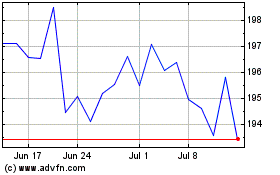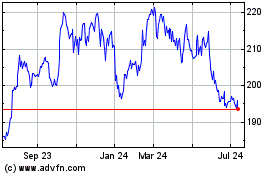Tax Deal For Illinois Exchanges May Face Legal Challenges
December 13 2011 - 4:20PM
Dow Jones News
The proposed tax deal hatched to keep Chicago's two big
derivatives exchange operators in Illinois could be challenged as
discriminatory against out-of-state companies, according to legal
experts.
Lawmakers were nearing agreement on a compromise to keep CME
Group Inc. (CME) and CBOE Holdings Inc. (CBOE), as well as retailer
Sears Holdings Corp. (SHLD), from moving operations out of
Illinois, but after months of talks, a pact could be vulnerable to
a challenge on constitutional grounds.
The package being voted on this week by Illinois lawmakers would
see big state tax cuts for the two Chicago firms, while
out-of-state rivals IntercontinentalExchange Inc. (ICE) and NYSE
Euronext (NYX) would likely see their own state tax bills
unchanged.
"Illinois is potentially benefiting in-state companies at the
expense of out-of-state companies," said Eric Tresh, a partner
specializing in tax law with Sutherland Asbill & Brennan LLP
and an outside counsel for Atlanta-based ICE, which has raised
objections to the Illinois proposal.
State lawmakers are making a second attempt this week to pass
the package, aimed to soothe outcry from CME and CBOE that their
Illinois tax bills are outsized versus other major companies in the
state. The protests followed a sharp increase in January in the
Illinois corporate tax rate to 7% from 4.8%.
A proposal passed Monday by the Illinois House of
Representatives and up for debate Tuesday in the Senate would tax
the exchanges on 27.54% of electronic trades, many of which are
seen originating beyond Illinois's borders. The Senate is expected
to pass the measure Tuesday afternoon.
The prospect is a deal for CME and CBOE, both of which right now
pay taxes to Illinois on 100% of such trades. For out-of-state
market centers like ICE, NYSE Euronext and Nasdaq OMX Group Inc.
(NDAQ), such a shift ultimately could result in a higher Illinois
tax bill because currently less than 27.54% of their trading
business is seen coming from Illinois, legal experts said.
NYSE Euronext, Nasdaq OMX and ICE in November teamed to lobby
Illinois lawmakers for an opt-out provision to the proposal,
enabling them to continue paying taxes under their existing regime,
in which they pay Illinois taxes only on trades that they identify
to have originated in that state. For those exchanges, that level
is generally seen below the 27.54% level set out by the pending
legislation.
That avoided any constitutional challenge to the package on
grounds that Illinois was directly favoring its native exchanges.
But providing a break to CME and CBOE while essentially keeping the
status quo for other exchanges still leaves the proposal open to a
legal attack, said Richard Pomp, a tax law professor at the
University of Connecticut.
"This is a pretty blatant attempt to skew the playing field in
favor of the home team, although it is done in a less transparent
manner than just legislating a lower rate," said Pomp, who isn't
directly involved in the matter. "I would think [a challenge on
constitutional grounds] would have a pretty good chance of success
if [the bill] passes."
Spokesmen for ICE, NYSE Euronext and Nasdaq OMX declined to
comment as to whether they would pursue such a challenge, which
would come in Illinois state court.
Democratic Sen. Toi Hutchinson, the bill's chief sponsor in the
Illinois Senate, said Tuesday that the provision was drafted with
an eye toward protecting against challenges. "Our legal staff feels
the opt-in clause survives the constitutionality test," she
said.
Hutchinson said rival exchange operators hadn't raised the issue
with her.
Representatives for CME and CBOE declined to comment. In recent
months, CME has fielded offers from states such as Indiana, Florida
and Texas to relocate its business.
-By Jacob Bunge, Dow Jones Newswires; 312-750-4117;
jacob.bunge@dowjones.com
CME (NASDAQ:CME)
Historical Stock Chart
From Jun 2024 to Jul 2024

CME (NASDAQ:CME)
Historical Stock Chart
From Jul 2023 to Jul 2024
